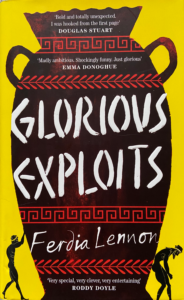
I’d heard so many great things about this book. Quite simply, it is fantastic. The very many awards and shortlists support that feeling and include (but not limited to): Waterstones Debut Prize 2024, Bollinger Everyman Wodehouse Prize 2024, Authors Club prize for debut fiction, shortlisted in the Nero awards for debut fiction, shortlisted for the Dylan Thomas prize 2025, shortlisted in the Nibbies debut category 2025. There’s probably more that I’ve missed and more yet to come. But I think the point’s clear: this book is great and many prize judging panels think so too.
Glorious Exploits is set in 412 BCE in Syracuse, Sicily after the attempted Athenian invasion. The story is told in Dublin dialect from the perspective of Lampo, an out of work pottery maker. After the invasion attempt is stopped by Sparta, the remaining soldiers are kept prisoner in quarries in the town. Lampo and his friend Gelon decide to put on a play for the locals using the Athenians as actors; driven by Gelon’s love of Athenian culture and, in particular, the plays of Euripides. We are then pulled along at a wonderfully engaging pace following Lampo and Gelon, two directors in training, as they attempt to bring Athenian theatre to the people of Syracuse.
Our leading directors do form the basis of a double-act: Lampo is more comic relief, whilst Gelon is definitely your deeper, more mysterious and visionary ‘straight-man’. Gelon has an extra layer of drive, which may stem from his own personal loss and perspective on life. Devoid of family, does Gelon now need to bring something fresh and good into their war-torn world and is that his motivation? Together, the duo are a more extreme Morecambe and Wise, or perhaps Father Ted and Dougal, with Lampo’s Dougal possessing a much greater capacity for growth and change. Lennon breathes humour and complexity into Lampo and Gelon sculpting a flowing account of male friendship in adverse situations.
The humour is certainly ever-present and succeeds by forcing the comparison with post-invasion conditions in war-torn Syracuse and other towns of Sicily. Descriptions of the quarry prisons (essentially death camps) as well as the feelings of the local children – who have lost fathers and brothers in the conflict – are particularly hard-hitting. Lennon does not shy away from addressing the harrowing reality of war and what is required to carry on: ‘You don’t rob a man of his suffering’.
Glorious Exploits, almost in a taoist sense, balances opposites to form the whole: with great suffering comes an equally great capacity for hope as Lampo puts it ‘It’s hope that makes us afraid, and I remind myself that a man should be grateful for his fears, ‘cause it means he has something to lose and to win’. These themes are what I loved so greatly in this book, the masterful way that comedy and tragedy must be melded; one needs the other.
In addition to hope there is also a strong theme of friendship and love in Glorious Exploits: Lampo and Gelon have to wrangle with their own expectations and rationale for putting on the play, as well as the relationships with the actors. In a sort of parallel to the Christmas Day No-Man’s Land football match, these two opposing states come together. In doing so Lennon reminds us of the commonality between all peoples and how the arts have a wonderful power of unification.
In a publishing field rich with retellings of Greek history it was intriguing to see how Lennon adapted his story. With Glorious Exploits covering the Sicilian Expedition, the combination of humour and dialogue renders Lennon a new and exciting niche that is truly his own. I very much look forward to reading any other works that Ferdia Lennon publishes.
D